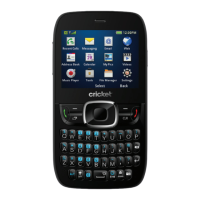53CARE AND MAINTENANCE
• Be sure to check the alarm settings to ensure that the phone will not
automatically power on during the ight.
Hospital safety
• Switch off your phone and remove the battery in areas where the use of
mobile phones is prohibited.
• Follow all instructions regarding the use of handsets in a medical facility.
Road safety
• You must exercise proper control of your vehicle at all times. Give your full
attention to driving.
• Pull over to the side of the road and park before making or answering a
call, if driving conditions require it.
• Obey all local laws regarding the use of handsets while driving.
• Do not stop on the hard shoulder of a highway to answer or make a call,
except in an emergency.
• Switch off your handset at a gas station, even if you are not refueling
your car.
• Do not store or carry ammable or explosive materials near the handset.
• Electronic vehicle systems, such as anti-lock brakes, speed (cruise) control,
and fuel injection systems are not normally affected by radio transmissions.
Observe all warnings from your vehicle’s manufacturer regarding the use
of mobile phones and possible interference. If you observe your vehicle
functioning incorrectly and suspect that it may be related to interference
from the handset, do not switch on the handset in or near the vehicle until
the vehicle has been checked by a qualied service technician.
52 CARE AND MAINTENANCE
CTIA requirements
• Do not disassemble or open, crush, bend or deform, puncture or shred.
• Do not modify or remanufacture, attempt to insert foreign objects into the
battery, immerse or expose to water or other liquids, expose to re, explosion,
or other hazards.
• Only use the battery in the system for which it is specied.
• Do not short-circuit a battery or allow metallic conductive objects to
contact battery terminals.
• Replace the battery only with another battery that has been approved for
the device per this standard: IEEE-Std-1725. Use of an unapproved battery
may present the risk of re, explosion, leakage, or other hazard.
• Promptly dispose of used batteries in accordance with local regulations.
• Battery usage by children should be supervised.
• Avoid dropping the phone or battery. If the device or battery is dropped,
especially on a hard surface, take it to a service center for inspection.
• Improper battery use may result in a re, explosion, or other hazard.
• For devices that utilize a USB port as a charging source, the device’s user
manual shall include a statement to the effect that the phone shall only be
connected to CTIA certied adapters, products that bear the USB-IF logo, or
products that have completed the USB-IF compliance program.
Aircraft safety
• When traveling by air, power off your phone prior to takeoff.
• Obey all posted signs and crew instructions regarding the use of mobile
phones on the aircraft.

